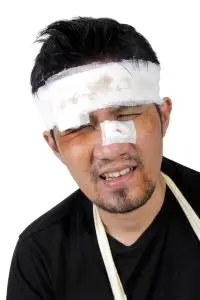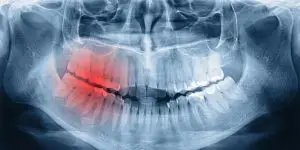If you suspect you may have broken your jaw, you may wonder whether you need to be seen by a doctor or a dentist, and how serious it is. Both doctors and dentists can treat you. If you experience trouble breathing or your tongue swells, seek treatment from a medical doctor immediately. A broken jaw is a dental emergency and should be treated as such. Here’s what you need to know if you break your jaw.
Common Causes of Broken Jaws
 Anytime there is an impact with your jawbone and something else, a fracture or break may occur. Slip and falls are one of the common causes of broken jaws. Someone may slip or trip and hit their face on the ground, a counter or the bathtub, breaking their jaw. Car accidents are another common cause. The impact from an accident can send someone’s face into a steering wheel, leading to a broken jaw.
Anytime there is an impact with your jawbone and something else, a fracture or break may occur. Slip and falls are one of the common causes of broken jaws. Someone may slip or trip and hit their face on the ground, a counter or the bathtub, breaking their jaw. Car accidents are another common cause. The impact from an accident can send someone’s face into a steering wheel, leading to a broken jaw.
Contact sports can also lead to plenty of broken bones, including your jaw. Balls hitting the face, being tackled, and other physical moments during a sporting event causes jaw injuries. Finally, punches and fighting are also common culprits of this dental emergency. Whether you box and get hit in the face or a bar fight breaks out and someone punches you, a broken jaw is a likely outcome.
Common Signs of a Broken Jaw
If there has been an impact to your jaw and you are in pain, you might wonder if you really broke it. If you have, you will likely experience severe pain in your jaw, chin, teeth and/or beneath or into your ears. You may be unable to open your mouth wide. There may feel tenderness or have bruising along your jawline. Talking, chewing, and swallowing may become quite difficult or impossible. Lastly, your jaw or teeth (or both!) may feel out of alignment.
Why Are Broken Jaws So Serious?
 A broken jaw is a serious dental emergency because of the potential impact on the alignment of your teeth, or your dental bite. If the bone is left to heal on its own and your bite is off, this can affect your ability to chew, how straight your teeth are, and the overall health and well-being of your teeth both now and into the future. Treating a bite that is misaligned is much harder once the jaw bone heals. This is why you should seek emergency dental treatment early on.
A broken jaw is a serious dental emergency because of the potential impact on the alignment of your teeth, or your dental bite. If the bone is left to heal on its own and your bite is off, this can affect your ability to chew, how straight your teeth are, and the overall health and well-being of your teeth both now and into the future. Treating a bite that is misaligned is much harder once the jaw bone heals. This is why you should seek emergency dental treatment early on.
What to Do After the Break
Immediately after you have been injured, ice your jaw and face. You want to keep the swelling down as much as possible. This makes it easier to diagnose and treat you. If needed, tie something around your jaw and head to help stabilize your jaw. From there, you will either need to seek treatment from a doctor or an emergency dentist. Do not delay on this for all the reasons listed above and because it can be extremely painful, too.
What Can You Expect During the Recovery Process?
If you have a simple, clean break, not much can be done. The break will heal on its own. You may be given pain medication to help with the pain. You will be told to follow-up with a dentist, usually in about six to eight weeks, to ensure the bone heals properly and your bite is not affected.
If your bite is affected or if the bone is broken in multiple places, oral surgery may help correct the problem. You will need to follow up with the oral surgeon or dentist who performed the surgery routinely to ensure the bone is healing and that no infection is present.
Conclusion
If you know or suspect that you have a broken jaw, you will want to be seen by an emergency dentist in Phoenix as quickly as possible. It is best to be seen early on, before swelling and bruising occurs. Dental Brothers, with offices in both Mesa and Phoenix, Arizona, can help you with all of your emergency dental needs.
